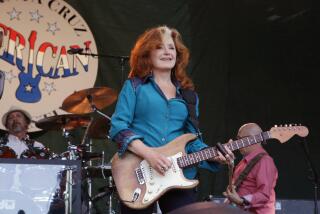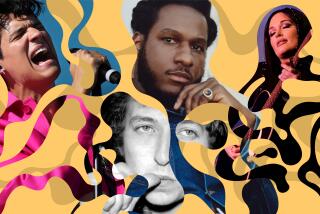SOUNDS AROUND TOWN : Pop Goes the Jazz : There’s more to Fourplay, which is coming to the Ventura Theatre, than meets the ear.
In the ‘70s, pop and jazz met and were destined to be joined by a holy hyphen.
The pact was made, and now the pop-jazz market, bolstered by Kenny G. and his type, has grown to the point where you hear the pleasant sounds in finer grocery stores and dental offices everywhere. Those tinkly, gently funky tunes wash over you while you’re perusing the canned goods or getting your teeth cleaned. They pop up in TV theme songs. It is the feel-good music of the ‘90s.
This history plays an implicit role in the success story of Fourplay, coming to the Ventura Theatre on Monday. The current kings of the pop-jazz field have clung to the top position of the Billboard jazz chart for a whopping 23 weeks. (Does this make them the Garth Brooks of contemporary jazz?)
Keyboardist Bob James, guitarist Lee Ritenour and drummer Harvey Mason were early architects of the genre. Bassist Nathan East came onto the studio and jazz fusion scene in the ‘80s.
Together, these veterans have formed a band whose commercial appeal just won’t quit. It’s not hard to figure out why. The songs are perfectly harmless, perfectly hummable. The solos are concise and the rhythms tumble about amiably.
But there is more to Fourplay than meets the ear. Detractors of the style may not listen long or hard enough to appreciate subtleties and detours from convention within the tunes.
Last week, James spoke on the phone from Chicago, where the band had played only the second show of its young career. What began as a studio project over a year ago has now blossomed, belatedly, into a live act. They’re taking their act to market.
Has the response to the album taken you by surprise?
Of course, the level that people have seemingly accepted it is a very happy surprise. I think that we had so much fun in the process of making the record that that in itself was very fulfilling even before the record came out. That was a nice way of buffeting ourself against whatever might happen with the public.
Was the original vision for the group that it be just a departure for those involved?
Somewhat. I had had an idea in the back of my head wondering what it would be like just being a member of a group that was a sort of democratic entity. Like some other groups that I had admired in the past, I liked the idea of a group taking on an identity of its own.
You’ve compared Fourplay to the Modern Jazz Quartet. That makes sense, in one way, because there’s something distinctive about a jazz group without a horn player. There’s a more percussive aspect to the overall sound. Ritenour could be considered the surrogate vibist.
Actually, that analogy has been misinterpreted a few times because I wasn’t, in any way, thinking about our sounds being similar--just the fact that there were four of them and this was a group that stayed around for a long time and took on an identity that was very different than the individual players. That’s what we hoped to do.
I don’t know if I have the capability, at my age, of staying around as long as MJQ. I don’t want to say how old I would be if we achieved that kind of longevity, but we wanted to counter the idea that a few people had when they heard what we were doing--that it was just going to be an all-star, one-shot type of studio session and then we’d all be off working on our other careers.
From what you describe, the band’s name seems to have a kind of meaning beyond the pun.
I guess the thought in our heads was, what would be short and to the point? It turns out to be even more to the point than we anticipated in the beginning. Our style, if we are emerging with one, seems to be very romantic, on the mellowish side of the spectrum. That’s just what came out naturally. It wasn’t that we set out to do that in any specific way. All four of us tend to like the kind of music that kicks in at about 11 or 12 o’clock at night.
Is there a common approach to music that you all share?
It seems that all four of us have a similar desire to make music that sounds simpler than it is. We have a lot of pride in not wanting to be simplistic, but at the same time, we like music when it’s simple and very direct.
That always turns out to be much harder to achieve than it might seem to the listener after it’s already done and they say, “Well, gee, that just seems like you’re falling off a log.” When they feel that way, we’re very happy. But in the case of all four of our composition styles, in different ways, there is a lot of stuff in there where there are surprises, when things don’t go exactly where you might expect them to go.
Do you see Fourplay as a kind of crystallization of the pop-jazz genre that you had a hand in creating?
It would be nice to think that we’re part of that process. I don’t know. I’ve never been very good at being able to step back and see what the significance or lack of significance of what we’re doing is. I’m generally too busy playing or writing or doing what we do. That’s enough for me.
* WHERE AND WHEN
Fourplay at the Ventura Theatre, 26 S. Chestnut, in Ventura, on Monday at 8 p.m., $21.50. For more information, call 648-1888.
More to Read
The biggest entertainment stories
Get our big stories about Hollywood, film, television, music, arts, culture and more right in your inbox as soon as they publish.
You may occasionally receive promotional content from the Los Angeles Times.









